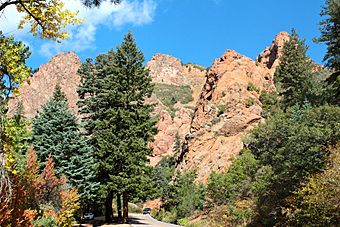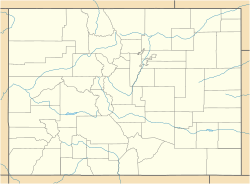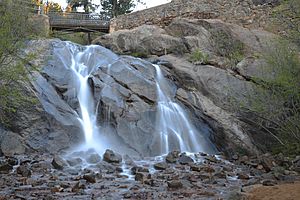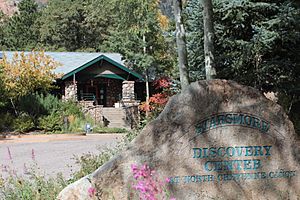North Cheyenne Cañon Park facts for kids
Quick facts for kids |
|
|
North Cheyenne Cañon Park
|
|

North Cheyenne Cañon Park
|
|
| Location | 2110 N. Cheyenne Cañon Road, Colorado Springs, Colorado |
|---|---|
| Area | 147.7 acres |
| NRHP reference No. | 09000489 |
| Added to NRHP | 2009 |
North Cheyenne Cañon Park (also called North Cheyenne Canyon Park) is a beautiful regional park in Colorado Springs, Colorado. It's so special that it's listed on the National Register of Historic Places. This means it's an important historical and natural site!
The park was also known as Colorado College Park and Cheyenne Park in the past.
Contents
Exploring North Cheyenne Cañon Park
North Cheyenne Cañon Park is located at 2110 N. Cheyenne Cañon Road. A "cañon" is another word for a deep, narrow valley or canyon. This amazing park covers about 1,277 acres. It's home to famous spots like Helen Hunt Falls, the Starsmore Visitor and Nature Center, and Silver Cascade Falls. You can also find the White Fir Botanical Reserve here, which protects special plants.
The park offers 56 miles of trails. These trails are perfect for hiking, horseback riding, and mountain biking. There's also a scenic drive where you can enjoy the views from your car. You'll find many picnic areas throughout the park. There's even a large group shelter you can reserve for bigger gatherings.
At the top of the canyon, there's a dirt parking lot. From here, you can get to many trailheads and mountain biking paths. You can also access Gold Camp Road from this spot. Keep in mind that parking can be limited. While cars can't go onto Gold Camp Road or High Drive from here, hikers and bikers can easily pass through. There are also pull-off spots along the road leading up to the parking lot if the main lot is full.
Starsmore Visitor and Nature Center
The Starsmore Visitor and Nature Center is found at the entrance to North Cheyenne Cañon Park. It's a great place to start your adventure! Inside, you'll find fun, hands-on exhibits and learn about nature programs. The center also provides lots of helpful information about the park. The lower Columbine Trail begins near Starsmore and goes for about four miles up to Helen Hunt Falls. The Starsmore Center is open from April to October.
Park History: How it Became a Park
General William Jackson Palmer was a very generous person. He donated land to create North Cheyenne Cañon Park and many other parks in Colorado Springs. Some of these include Monument Valley Park, Bear Creek Cañon Park, Palmer Park, Pioneer Square (South) Park, and Prospect Lake. In total, he gave over 1,270 acres of land for parks!
The land General Palmer donated for North Cheyenne Cañon Park included beautiful spots like Silver Cascade Falls, Helen Hunt Falls, and the land for N. Cheyenne Cañon Road. In 1885, the citizens of Colorado Springs voted to buy even more land for the park. The city then purchased another 640 acres in North Cheyenne Cañon. The Park Commission thought this canyon was "by far the grandest and most popular of all the beautiful cañons near the city."
Trails for Adventure
After you pass the Helen Hunt Falls Visitor Center, N. Cheyenne Cañon Road ends at a dirt parking lot. This spot is where Gold Camp Road and High Drive meet. From here, hikers can explore many different trails.
Columbine Trail
The Columbine Trail is about 4 miles long. It slowly climbs up the canyon, starting from the Starsmore Visitor and Nature Center. The trail ends at the dirt parking lot at the top of the canyon. It's important to know that this trail is not a loop, so you'll need to walk back the way you came. Also, the trail crosses N. Cheyenne Cañon Road several times.
St. Mary's Falls Trail
To reach St. Mary's Falls Trail, you first need to hike 1.2 miles along Gold Camp Road. When you get to the third tunnel on Gold Camp Road, the trail goes up over the tunnel. It then goes down into Pike National Forest and continues for another 1.6 miles to the base of the falls. This trail has many switchbacks (zig-zag turns), and some might not be clearly marked. There's also a fork in the trail that leads to the peak of Mount Rosa.
Seven Bridges Trail
Don't mix this up with the Seven Falls in South Cheyenne Cañon! This trail is about 1.5 miles long and is considered a moderate hike. You can get to it from the west side of Gold Camp Road. The trailhead isn't clearly marked from the road, but look for a clearing on the right side if you're coming from the dirt parking lot. The trail crosses Cheyenne Creek many times using a series of wooden bridges, numbered one to seven. After the last bridge, the trail ends. However, if you're feeling extra adventurous, you can continue onto much harder terrain that connects to other trails in the area.
 | Kyle Baker |
 | Joseph Yoakum |
 | Laura Wheeler Waring |
 | Henry Ossawa Tanner |





